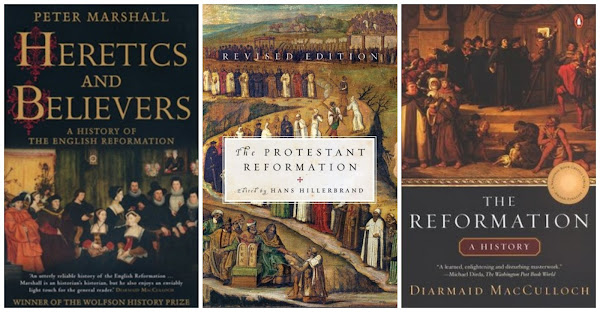Hamlet's Jewish & Christian Reformers
In Shakespeare’s lifetime (as in ours for some), there was an anti-Semitic tendency among Christians to view Judaism as an inferior faith and to view Jesus, Son-figure of a Trinitarian God, as Judaism’s promised messiah sent to redeem humanity from their sins, establishing a "one true faith."
An alternative view: Jesus was a Jew, and a reformer, who lived and preached at a time when Judaism had been corrupted in large part by the Roman occupation.
Reformers like Jan Hus, Luther and Calvin may have thought it too proud to consider their own reformer-roles analogous to that of Jesus (Luther once destroyed a chair he had made because he believed he had become too proud of it). But in fact we might consider that they attempted to do for Christianity something analogous to what Jesus attempted to do for Judaism.
Hamlet contains references to many reformers:
- St. Gis (Jesus).
- Wittenberg, where Luther announced his theses for reform.
- Bernard of Clairvaux, namesake of Bernardo, the sentinel, was a Benedictine monastic reformer.
- Francis of Assisi, namesake for Francisco, the sentinel, believed he had been commissioned by a voice from heaven to rebuild (reform) the church, which had fallen into disrepair: to serve the sick and poor, to preach, to be “God’s fool,” and to embrace poverty.
- "Baptista" (the player queen) is a reference to the prophet John the Baptist, a reformer mentioned in the Christian gospels.
- Prince Hamlet himself is a reformer of sorts who wrestles with what it means to witness corruption in the state, and a time “out of joint,” in need of being set right.
There are similar tensions between old and new faiths in “The Merchant of Venice,” where Shylock (of the “old faith,” Judaism) is forced to convert to Christianity, analogous to how Catholics (of an older faith) were forced to conform to English Protestantism.
Corruption and reform were certainly on Shakespeare’s mind in writing Hamlet.
When Christians of Shakespeare's England thought of the reformation of Christianity - the long history of efforts to reform the Roman Catholic Church, the Protestant reformation(s), the resulting proliferation of Christian denominations - they had divergent opinions, as people do today. What did they think about it?
Protestants: That reformation was long overdue?
That reforming a huge, corrupted, centuries-old institution was hopeless?
Catholics: That some reformers went too far, and threw out the baby with the bathwater?
Did institutional resistance to reform doom early efforts to failure, and distort later efforts?
When reformers attempted to intercede on behalf of other Christians, their efforts were met with resistance and violence. Did the trauma of institutional resistance doom reformers to stop believing in the usefulness of intercessory prayer?
Because the institution and its representatives seemed so closed to repentance and change, did it encourage Protestant belief in things like predestination, with Protestant doctrine taking on the distortions of the intransigent institution’s sins?
~~~~~~~
IMAGES: Some recommended reading about the Protestant Reformation:
LEFT:
Heretics and Believers: A History of the English Reformation (2017), by Peter Marshall;
CENTER:
The Protestant Reformation, revised edition (2009), edited by Hans J. Hillerbrand
RIGHT: The Reformation: A History (2005), by Diarmaid MacCulloch.
~~~~~~~~~~~~~~~~~~~~~~~~
Disclaimer: If and when I quote or paraphrase bible passages or mention religion in many of my blog posts, I do not intend to promote any religion over another, nor am I attempting to promote religious belief in general; only to explore how the Bible and religion influenced Shakespeare, his plays, and his age.
~~~~~~~~~~~~~~~~~~~~~~~~
~~~~~~~~~~~~~~~~~~~~~~~~~~~~~~~~~~~~~~
Thanks for reading!
~~~~~~~~~~~~~~~~~~~~~~~~~~~~~~~~~~~~~~
~~~~~~~~~~~~~~~~~~~~~~~~~~~~~~~~~~~~~~
My current project is a book tentatively titled Hamlet’s Bible, about biblical allusions and plot echoes in Hamlet.
Below is a link to a list of some of my top posts (“greatest hits”),
including a description of my book project (last item on the list):
https://pauladrianfried.blogspot.com/2019/12/top-20-hamlet-bible-posts.html
I post every week, so please visit as often as you like and consider subscribing.
To find the subscribe button, see the = drop-down menu with three lines in the upper left.


Comments
Post a Comment